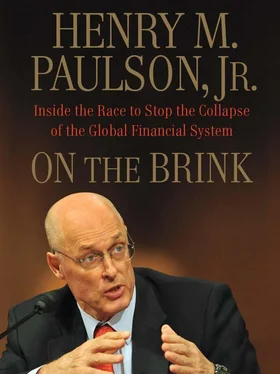July 11 turned out to be a day for the books. The president and the Treasury secretary’s reassuring words about the GSEs failed to soothe the markets—Fannie’s shares fell 22 percent, to $10.25, while Freddie’s dropped 3.1 percent, to $7.75. Then, late in the afternoon, the Office of Thrift Supervision seized the teetering IndyMac Federal Bank, with more than $32 billion in assets, and turned it over to the FDIC. It was to that point the third-biggest bank failure in U.S. history.
The news reports of that day showed the first scenes of depositors lined up in the hot sun outside the failed thrift’s headquarters in Pasadena, California, desperate for their money. The government guaranteed deposits up to $100,000, but these citizens had lost faith in the system. This all-too-eerie reprise of the haunting images of the Great Depression was the last thing anyone needed just then.
Saturday, July 12, 2008
We needed congressional action to contain the deteriorating situation at Fannie Mae and Freddie Mac, so on Saturday, July 12, I tried calling Chris Dodd and Nancy Pelosi, but I couldn’t reach either of them during the day. Finally, Nancy returned my call from California at about 10:30 p.m. Normally, I’d have been fast asleep, but I was still up and working. When I told her we needed emergency powers to invest in the GSEs, she came right back at me, ready to start negotiating.
“This won’t be easy,” she said. “Will the president support our housing legislation?”
I told her I thought so. That is, with the exception of the block grants to state and local governments.
She rolled right past me. “We’re going to get the block grants,” she said.
That was a problem. House Republicans and the administration absolutely hated all of the Democrats’ proposed housing legislation but most especially the block grants. Barney Frank had explained to me how important they were to him and his colleagues, but his foremost objective was to get HOPE for Homeowners and GSE reform through. He had indicated that if the president made clear he would not accept the grants, they would be removed from the bill.
“I’ve got this deal with Barney,” I explained to Nancy. “If the president strongly objects to the grants, they’re going to come out.”
“Well, Barney didn’t talk to me. I don’t know how he can make deals like this without talking to me. I’m going to call him.”
Worried that I’d said too much, I decided I had better get to Barney before Nancy could. I reached him in Boston on his cell, but I could barely make out what he was saying over peals of laughter and a host of chattering voices in the background.
“Barney, can you hear me?” I said.
“I hear you, Hank,” he shouted, then paused, and with perfect timing quipped, “Can the president?”
I told him about my conversation with Nancy and that she hadn’t known about our understanding.
“That was just between the two of us, Hank,” he said, clearly annoyed. He said he would do his best, but that things had changed—given the dire circumstances, the threat of a presidential veto now seemed empty.
Block grants were just one of the political land mines we had to avoid. The weekend of July 12 and 13 was a blur of nonstop phone calls, meetings, and brainstorming sessions: Ben Bernanke, Tim Geithner, and Chris Cox. Chuck Schumer, Barney Frank, and John Boehner. Conference calls, one-on-one calls, still more meetings.
Though we did not have firsthand access to Fannie’s and Freddie’s financials, we knew we would need billions of taxpayer dollars to backstop the institutions from catastrophic failure and a strong regulator with powers to make subjective judgments about capital quality, just as other prudential regulators were able to do.
With this in mind, I had asked the Federal Reserve if it could provide discount-window funding for the GSEs. Ben Bernanke made clear that this was properly a fiscal matter, but indicated that the Fed Board of Governors would be willing to provide temporary support to the GSEs if I could assure them that Congress was likely to grant us the emergency legislation we would be seeking. I told him I would consult with congressional leaders and the GSEs and let him know for sure before his noon board meeting on Sunday.
I had very solid reasons for requesting additional powers: I was concerned that investors had lost faith in Fannie and Freddie. The mortgage giants had lost almost half of their value that week. This worried the debt holders, from U.S. pension funds to foreign governments, that held hundreds of billions of dollars of GSE paper, and raised red flags about the companies’ ability to fund themselves in future auctions.
Nonetheless, we faced the catch-22 of crisis policy making. There was always the chance that by asking for these powers we would confirm just how fragile the GSEs were and spook investors. Then, if Congress failed to come through, the markets would implode. The stakes were enormous: more than $5 trillion in debt either guaranteed or issued by Fannie and Freddie. Every time spreads grew—that is to say, the yields of these securities increased relative to Treasuries—investors lost billions of dollars. It was not my job to protect private investors. But a collapse of the GSEs would have drastic consequences for the economy and the financial system.
Fannie and Freddie needed to be brought on board, quickly. Without their support, legislation would go nowhere. On Saturday I called Dan Mudd and Dick Syron to get their cooperation. Mudd, the Fannie Mae CEO, wanted to save his company and asked a lot of questions. Syron, though, was compliant; he was looking for a way out. He was on a short leash and had had a difficult time working with his board. But the next morning, when I spoke with them at his request, his directors were supportive.
Then I huddled with my team at Treasury to review our options and nail down our proposed legislation. We were in an awkward position. The GSEs and their regulator, the Office of Federal Housing Enterprise Oversight, had said that the companies were adequately capitalized for regulatory purposes, but the market was skeptical. To know for sure, we would need experienced bank examiners to comb through their books. But we did not have the power to send in examiners.
Instead, we needed to get standby authority to deal with a potential liquidity problem, such as a failed auction of debt, and the authority to make an equity investment, if necessary. We didn’t want to put a dollar limit on this authority because that would imply that we had identified the size of the problem, which we had not. Having an unlimited capacity—we used the term unspecified —would be more reassuring to the markets. Asking for this was an extraordinary act—indeed, an unprecedented one—but my team agreed we had to try.
The difficulty came when I said that our powers should have no set expiration date. Fannie and Freddie guaranteed securities for up to 30 years, and I questioned whether temporary standby authorities would be enough to satisfy long-term investors. But after a tense conversation, Kevin Fromer and David Nason convinced me.
“Hank, if we’re going to sell this on the Hill, it needs to be temporary,” Kevin insisted.
We decided to ask for unlimited investment authority until the end of 2009, to give the incoming administration a year of protection.
From my calls, I knew there was a lack of enthusiasm on the Hill for what we wanted. At the same time, I had not gotten a single definitive No way. So on Sunday, July 13, I told Ben I thought we could get Congress to act. When the Federal Reserve Board met at noon, they agreed to provide a temporary backup to Fannie and Freddie through the New York Fed. Later that afternoon, I walked out onto the west steps of the Treasury Building, facing the White House and a group of reporters. The day had turned overcast. Storm clouds moved in, and the wind began to pick up as I spoke.
Читать дальше












